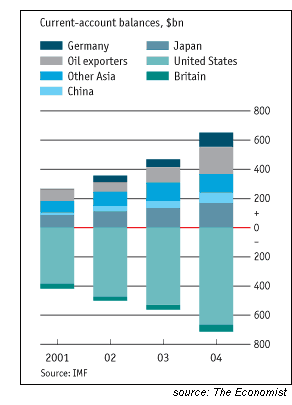

|
| weblog/wEssays | home | |
|
Doubling Down on 5-Card No-See-Um (September 26, 2005) To use a poker analogy: the world's bankers are doubling down, but they have no clue what the cards hold for the world economy. We are in uncharted territory in five major ways: And the dealer's first visible card:  The net result is an unprecedented number of opaque risks which could bring the global expansion to a halt.
Let's start with hedge funds, secretive, poorly regulated and now larger than most corporations or mutual funds.
Check out this
BusinessWeek expose on Cerberus, a hedge fund which started out with $10 million in 1992 and is now larger
than McDonald's, 3M or Coke. Would you like to know something about the company's inner workings? Sorry, that's
privileged, not public information like you get from a publicly traded company. Might Cerberus be
holding a trillion dollars in risky derivatives? Maybe. We'll never know until it's too late.
The net result is an unprecedented number of opaque risks which could bring the global expansion to a halt.
Let's start with hedge funds, secretive, poorly regulated and now larger than most corporations or mutual funds.
Check out this
BusinessWeek expose on Cerberus, a hedge fund which started out with $10 million in 1992 and is now larger
than McDonald's, 3M or Coke. Would you like to know something about the company's inner workings? Sorry, that's
privileged, not public information like you get from a publicly traded company. Might Cerberus be
holding a trillion dollars in risky derivatives? Maybe. We'll never know until it's too late.
Risk factor: unprecendented. Trillions of dollars are sloshing around, completely unregulated. While the markets are cheering that oil is "only" $63 a barrel today--stock markets around the world are roaring up in euphoria--the bottom line is still that supply is capped and demand continues to rise. Yes, giant new fields may be discovered, but it would take 10 years to start getting gasoline from them (that's if any are found, which is doubtful). And yes, the Saudis want to build a couple of refineries to process their heavy sulfur-laden crude oil, but that's at least a 7-year process. So there are no near-term solutions except to cut demand, and so far there are few indications that China's economy will need less oil or Americans will do more than trim the edges off their 23 million-barrel a day habits. Risk factor: unprecendented. Never before has total global supply of oil been unable to meet demand. As the new book End of the Line: The Rise and Coming Fall of the Global Corporation Risk factor: unprecendented. Interdependency and "just-in-time" component systems are now acutely vulnerable to local crises which could disrupt the entire chain. To assess the risks posed by trillions of dollars in exotic financial derivatives, scroll down to my September 16 entry for a chart showing the explosive growth of these "financial instruments." "Instruments" doesn't sound too scary, does it? Risk factor: unprecendented. No one knows how these trillions of dollars of inter-connected derivatives will unravel in a financial crisis. Such crises have not been outlawed--they are an integral part of the system. The chart above vividly shows the U.S. trade deficit is now so enormous that it is offsets the entire surplus created by the exporting nations. At 7% of GDP, our trade deficit is truly unprecedented. Historically, economies collapse on themselves at 5% of GDP trade deficits. Risk factor: unprecendented. No one knows how long the U.S. trade deficits can keep rising without triggering a reversal. Never mind the prospect that some terrorist cell will figure out that economic terrorism (blowing up a refinery, for instance) is the strategy to follow if you really want to bring the U.S. down. Let's just stick with the risks that are visible. As the global financial institutions continue to double-down their bets that these imbalances can continue expanding more or less forever, it has finally dawned on me that they have no clue what they're doing. Fearing any change might bring the system down, they continue doubling down the bet that the game can go on with the cards never being called, that is, turned up. Are they really holding four aces, and all these unprecedented risks are vanishingly small, or are they actually bluffing a hand of a pair of two's, a four, a nine and Jack? Go over the list again and decide for yourself. * * * copyright © 2005 Charles Hugh Smith. All rights reserved in all media. I would be honored if you linked this wEssay to your site, or printed a copy for your own use. * * * |
||
| weblog/wEssays | home |